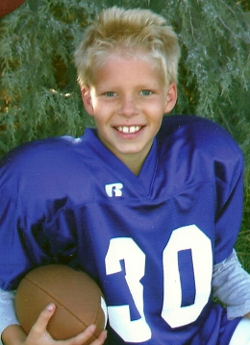|
 |
|
Skyler Smith,
12, Twin Falls, was an active, energetic
boy until losing his life May 30 to "the
choking game." |
Skyler Smith, 12, was an active boy who loved
athletics. He went in the house on the afternoon
of May 30 to wait out a storm, and was playing
alone in his room waiting for the sun to come up
so he could go ride his bicycle.
At about
4 p.m., his mother, thinking he may
have fallen asleep, went to wake him for the
rest of the days’ fun.
Instead, she found him
hanging from his bedpost, dead, victim of “the
choking game,” something he’d learned from his
friends at school.
“You must know that the
kids who are doing this are good kids,” Skyler’s
father, Joel, said. “They are into sports and
love life and love their families, just like my
son, Skyler. He was looking forward to baseball
this summer and starting football in the fall.
This game can affect any family, anywhere.”
The
Twin Falls, Idaho,
family says the only thing that keeps them going
in the wake of the tragic loss of their son is
by spreading the word to others that they may
not have to suffer similar tragedy.
The choking game isn’t a
game at all, though it’s often called that or
other names; “space monkey,” “pass out,” or “the
good kids game,” so-called because it offers a
“high” without the risk of getting caught with
drugs or alcohol. Simply put, these kids choke
themselves, some in the company of others, some
alone, with their own hands or a rope or belt,
cutting off the flow of blood to the brain.
When the pressure is
released, the blood floods the brain all at
once, setting off a feeling of light-headeness.
In actuality, that light-headed feeling is
brought about by brain cells dying.
In too many cases, this
misguided attempt for a “quick buzz” leads to
death.
While accurate numbers are
hard to compile, as many deaths are reported as
suicides or are not attributed to the choking
game, the Dangerous Behaviors Foundation has
documented 14 deaths of young people from around
the world so far this year, as well as another
17 who needed medical intervention to survive.
“It’s not something you’d
think would be going on in a state like
Idaho,” Joel said, “but
sadly, it is.”
While it’s not easy to know
whether your child might be playing this
potentially deadly game, there are signs to look
out for. Most obvious are suspicious marks on
the child’s neck, or their suddenly wearing
clothing to cover their neck. Finding ropes,
straps or belts laying around in places they
don’t belong, or defensive behavior when asked
about such things, can be another warning sign.
Bloodshot eyes can be a
giveaway, as ocular bleeding can occur from
choking. A child’s asking questions about the
effects, sensations or dangers of strangulation
can mean the child is considering playing the
“game.”
Talking to your child or to
other children close to you can go a long way
toward keeping them from trying the choking
game. If you’re not sure what to say or if you
want to know more, visit
http://www.gaspinfo.com or
http://www.chokinggame.net, both sites offer
valuable insight.
|

